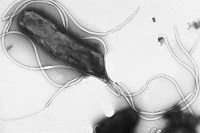 |
| Helicobacter pylori--Courtesy of Dr. Yutaka Tsutsumi, Fujita Health University School of Medicine |
In a new study, researchers from the University of Rhode Island and EpiVax, a spinoff of Brown University, have for the first time established human immune responses to a bacterium responsible for stomach cancer, marking a major step toward a vaccine against the pathogen.
Helicobacter pylori, or H. pylori, is a bacterium that infects the stomach and causes chronic gastric inflammation, which can lead to ulcers and stomach cancer. H. pylori is found in an estimated 50% of the human population.
"This pathogen has many ways to evade the immune response, and efforts to develop a vaccine have been unsuccessful," Lenny Moise, an assistant research professor at the University of Rhode Island and scientific director of vaccine research at EpiVax, told FierceVaccines.
Up until recently, H. pylori was thought to be associated only with stomach maladies, but scientists have also found beneficial effects of the bacterium, such as protection against inflammation in asthma, inflammatory bowel disease and esophageal reflux.
 |
| Lenny Moise, scientific director of vaccine research at EpiVax |
Moise, along with Dr. Steven Moss at Brown University and colleagues, used genomic sequencing and bioinformatics technology to identify 90 H. pylori-derived peptide sequences considered potential immune epitopes. An epitope is the molecular region on the surface of an antigen capable of producing an immune response. Testing these epitopes against immune cells taken from patients, the researchers found that these sequences elicited significantly higher inflammatory and immunosuppressive responses in those patients already infected by H. pylori. The findings, published on April 16 in PLOS ONE, are significant because these sequences could be vaccine candidates, Moise said.
"Now it will be possible to evaluate individual epitopes for their ability to stimulate these immune responses for a protective vaccine," Moise said.
The research, which is backed by a $13 million NIH grant, could also lead to new therapeutics for inflammatory diseases.
Though H. pylori is more prominent in developing nations, Moise said immigrants in Western countries often bring the pathogen with them.
Moise and his colleagues are now testing a vaccine in mice based on the peptide sequences described in the PLOS study.
- read the press release
- see the PLOS ONE paper